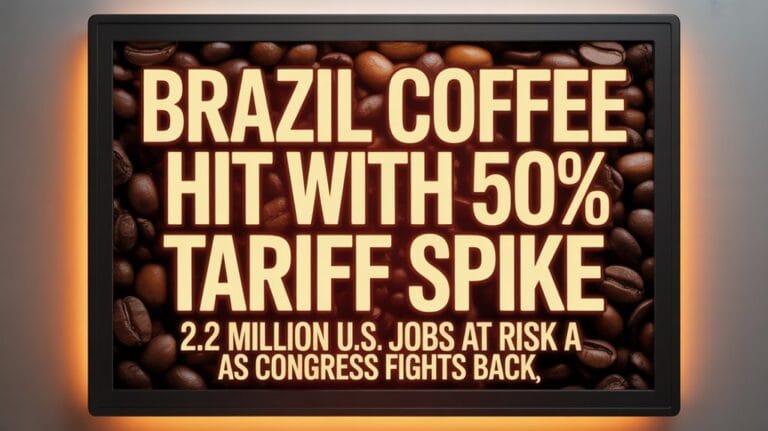The U.S. slapped hefty new tariffs on imported coffee starting August 1, sparking worries over rising costs for drinkers nationwide. A 50% tariff now targets Brazilian coffee—a major supplier of 30% of America’s green coffee—while Indonesia faces 32% and Vietnam 20%. These changes replace the initial 10% baseline set in April 2025, hitting shipments regardless of existing contracts once they clear customs after August 1. Brazil, which accounts for approximately half of the world’s coffee, faces the steepest increase, amplifying concerns over global supply stability.
The tariff implications could reshape coffee economics, as importers, roasters, and retailers face higher costs likely passed to consumers.
New tariffs threaten to upend coffee economics as businesses grapple with rising costs, likely transferring financial strain to everyday consumers.
Congressional leaders are pushing back. The bipartisan U.S. Congressional Coffee Caucus urged the U.S. Trade Representative to exempt coffee from tariffs, warning they threaten jobs and hike prices. The letter, signed by a bipartisan group of representatives including Suzanne Bonamici (D-OR), Tim Burchett (R-TN), and Maria Salazar (R-FL), highlights the industry’s role in supporting over 2.2 million U.S. jobs. Representatives Jill Tokuda (D) and William Timmons (R) stressed the U.S. relies almost entirely on imports, with domestic farms in Hawaii and Puerto Rico supplying less than 1% of demand. “Tariffs don’t punish foreign producers—they hurt American businesses and families,” Tokuda said.
The caucus argues cutting tariffs is key to keeping coffee affordable and supply chains stable.
Economists warn the tariffs will ripple through markets. The 50% rate on Brazil—a top supplier—could cause immediate price spikes. Costs at customs already climbed, with Yale’s Budget Lab estimating existing tariffs add $2,400 yearly to household expenses, including pricier coffee.
Indonesia and Vietnam’s higher tariffs add pressure. Analysts fear consumers might buy less or switch to cheaper brands, disrupting roasters, cafes, and retailers.
The Trump administration insists tariffs will take effect as announced. Talks haven’t delayed the August 1 deadline, though officials say discussions continue. The 50% Brazilian tariff stems partly from political disputes, escalating trade tensions.
Once shipments clear customs after the deadline, tariffs apply—even if deals were struck earlier. “There’s no grace period,” a Treasury spokesperson said.
While broader tariffs impact many goods, coffee’s 100% import reliance makes it distinctly vulnerable.
Global supply chains face strain. Brazil, Vietnam, and Indonesia dominate U.S. coffee imports, and higher costs risk supply delays or quality cuts. Specialty shops and big brands alike depend on these origins.
With no domestic alternative, experts say price hikes at grocery stores and cafes seem inevitable. As tariffs take hold, the debate over balancing trade policy and consumer costs brews louder.





